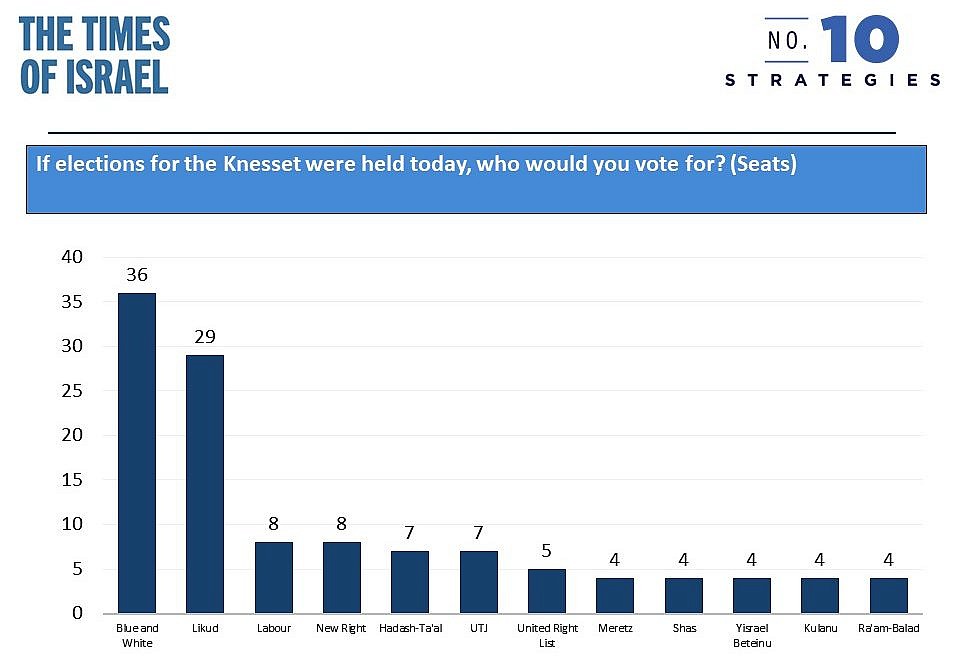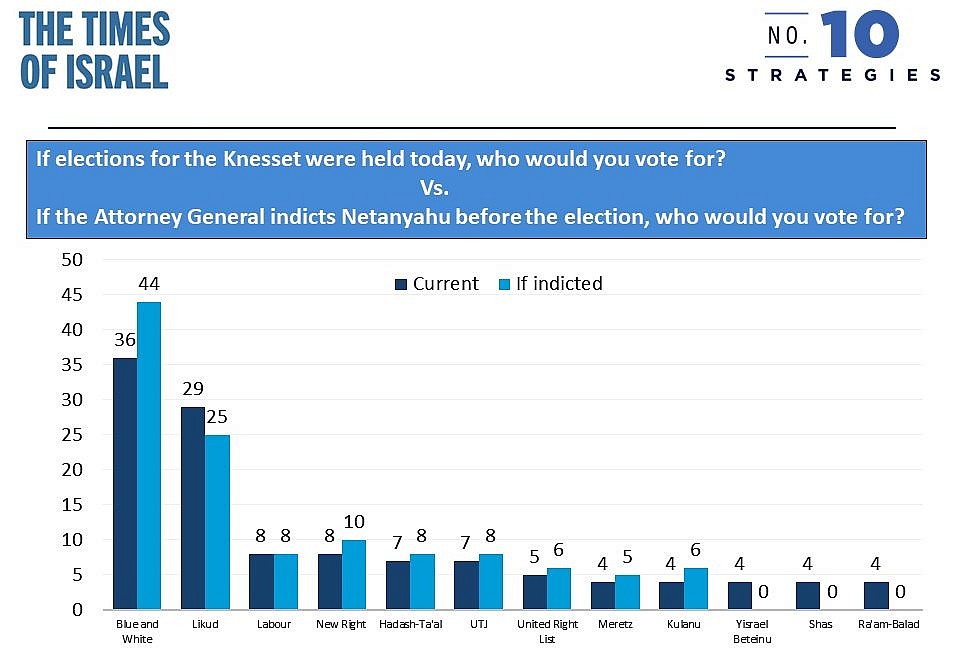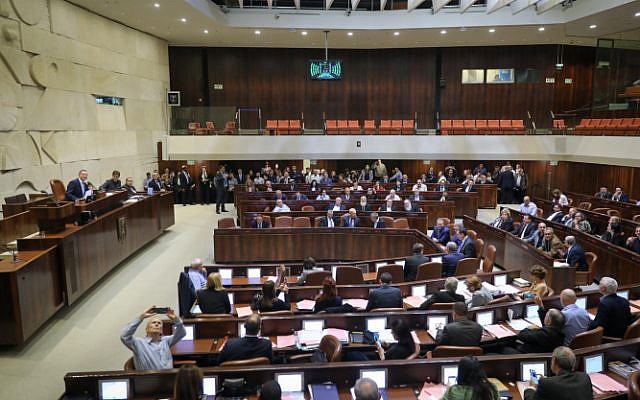Behind the numbers of Knesset seats each party may win hide hints to the success of Netanyahu and Gantz’s campaign messages, and the voter group that could decide the election
By SIMON DAVIES, TOI Today, 2:46 am
 This March 18, 2015, photo, shows a Prime Minister Benjamin Netanyahu election campaign poster lying among ballot papers at his party’s election headquarters in Tel Aviv. (AP/Dan Balilty)
This March 18, 2015, photo, shows a Prime Minister Benjamin Netanyahu election campaign poster lying among ballot papers at his party’s election headquarters in Tel Aviv. (AP/Dan Balilty)
In analyzing any survey, the temptation is to go straight to the ‘horse race’ numbers – who is winning and who is losing. While these figures are always interesting, the real insights are almost always hidden behind the top line numbers. Unless the election is tomorrow, the most important finding in any survey isn’t who is winning now, but what the survey can tell you about who will ultimately prevail on election day.
With this in mind, here are six key takeaways from this week’s Times of Israel-Number 10 Strategies survey:
1. The undecideds
While surveys are generally reported in terms of how many Knesset seats each party will receive, in reality this distorts the true picture. In any survey, the most important group are the ‘undecideds,’ who usually have the power to determine the election.
Our survey (the full results are here) found that almost one in five likely voters is still undecided (the figure would probably be much higher among eligible voters), meaning that up to 24 seats in the Knesset are in the balance.
So what do we know about the undecideds?
While (predictably) many of them are undecided on many of the questions, they are eight percent more likely to prefer Gantz as prime minister to Netanyahu (28% to 20%), and two thirds believe it is time for a change of leadership. Only 7% of this group state they are happy with the way Netanyahu is leading the country. The remaining 28% expressed the view that it is time for change, but believe there is no better alternative to Netanyahu.
The question, of course, is will the undecideds actually vote. According to our survey, 80% of all voters described themselves as “very likely” to vote and just 20% as “somewhat likely.” The undecideds, however, were split almost 50-50.
Much of the election will be determined by whether this group of undecideds, who are more likely to vote for parties on the left or center, actually turns out to vote.
2. The ‘Mandelblit swing’
With a decision from Attorney General Avichai Mandelblit on whether to indict Netanyahu on charges of bribery imminent, we tested the likely impact on the race if Mandeblit announces that the prime minister is to be charged pending a hearing.
The results were dramatic: Blue and White goes from a seven seat lead to a 19 seat lead. Significantly, over a quarter (28%) of those planning to vote for Likud said that they do not intend to vote for the party if the prime minister is indicted.
It is important to add two cautionary notes here. First, much of the movement is from parties dropping below the threshold following a possible indictment. Our poll found five parties hovering right around the threshold of 3.25%, and with a few votes shifting, Ra’am-Balad, Shas and Yisrael Beytenu fall just under the threshold, and their 3% goes to waste.
Second, we must be aware that with such consequential – and at this stage theoretical – issues, it is extremely difficult to see how they will play out if they become a reality.
3. Netanyahu’s anti-indictment message not strong enough
Wary of the above, Netanyahu has spent much of the campaign rallying against the possibility of an indictment. Rather than avoiding the issue or changing the subject, he is meeting it head on.
Our survey pitted two counter messages on this issue against each other: “The investigations into Benjamin Netanyahu are petty and politically motivated. They know he will win the election, so are trying to find other ways to get him out of office”; versus, “The investigations into Benjamin Netanyahu are extremely serious and should not be taken lightly. If he is indicted, he should immediately step down.”
When asked to choose which they most agreed with, 35% of respondents preferred the former, while 47% opted for the latter, with 18% unsure.
But Netanyahu’s message is not aimed at the broader public. It is a message to mobilize and motivate his base. Unsurprisingly, among Likud voters, 81% preferred the former statement — Netanyahu’s message. Yet when it comes to a wider target group, among those who consider themselves on the right or center right of the political map, little over half (56%) support Netanyahu’s line. On the left and in the center, inevitably, there is much stronger support for the counter argument, with 82% opting for the “he should step down” message.
4. The threshold is key
Our survey found that five parties are hovering right around the threshold: Ra’am-Balad, Kulanu, Shas, Meretz and Yisrael Beytenu. Were they to have lost a fraction of a percent, and fallen under the threshold in the scenario where Netanyahu is not to be indicted, the results would have been very different, with Blue and White jumping from 36 to 42 seats and Likud from 29 to 35. In the scenario where Netanyahu is to be indicted, Shas, Yisrael Beytenu and Ra’am Balad all slip below the threshold, radically changing the poll results. It is clear why those calling for more stable government call to increase the threshold, even slightly.
It is important to note that no survey can accurately pick up the fractions of a percent that in this case can make the difference between a party getting four seats and getting zero, which only adds to the uncertainty in the current state of the race.
5. Gantz’s low profile seems to be working
Considering this volatility, a good indicator of the likely result is often the head to head between the two leading candidates. In 2015, while the Zionist Union led in the polls for much of the race, its leader Isaac Herzog scored much worse in a head to head against Netanyahu. Despite the parliamentary system, Israeli’s tend to vote for individuals.
Our survey showed that this year, the head to head is much more even. 41% said they would prefer to see Benjamin Netanyahu as prime minister after the elections, 39% said Gantz (a statistical tie), with 20% unsure.
However, when it comes to the big issues, Netanyahu leads convincingly. When asked who is trusted to ensure Israel’s security, Gantz (a former IDF chief of staff) trails Netanyahu by 11% (41%-30%), while Netanyahu’s advantage on managing the economy is a significant 16% (41%-25%).
Yet these issue-based figures do not appear to affect Blue and White’s lead in the polls. The Gantz team has realized that a large number of Israelis are simply looking for change, and despite preferring Netanyahu on specific issues, are prepared to vote for an alternative. In light of this, Gantz’s current strategy of saying very little seems to be effective.
6. It’s the economy, stupid
Perhaps because both the leading candidates have such well-established security credentials, the issue of security is of less significance in this election than in previous contests. In fact, when given a list of five issues to pick as being the most important for the government to deal with, security (21%) trailed far behind economic issues (47%). Democracy, the rule of law and corruption came in third with 17%, followed by relations with the Palestinians, diplomacy and the peace process (11%), and religion and state (5%).
While the dominance of the economy cut across the ideological lines, the center-left / right divide was evident in the second set of choices. On the right, security was a clear second place with 30%, while in the center and on the left, democracy, the rule of law and corruption (28%) trumped the traditional issues of peace and diplomacy (15%) and security (9%).
The relative significance of the rule of law in this election provides an opportunity for Gantz to succeed with the sort of non-ideological campaign that he is currently waging. While a focus on the Palestinian issue would turn off soft-right voters, and possibly cause fractures within his own grouping, the rule of law issue enables him to attack the prime minister on non-ideological grounds, on which he is on a much stronger footing.
Simon Davies, a partner at Number 10 Strategies, is an international political consultant and pollster who has conducted opinion research, devised and executed winning strategies for presidents, prime ministers and political parties in over 15 countries on four continents.











Sorry, I got so worked up with indignation that I left out the reference to the article in Thursday’s Jerusalem Post: “NETANYAHU, UNFAZED BY INDICTMENT, VOWS TO BE PRIME MINISTER FOR YEARS.Netanyahu on corruption charges: “This house of cards will collapse.”BY LAHAV HARKOV FEBRUARY 28, 2019 22:02 “
Everyone should read this summary of the Prime Minister’s adress answering the allegations against him. I agree with Bibi’s defense. THis is a witch hunt in which they have even gone after his wife.
Shame on Israel for persecuting its elected statemen even while they are in office, and allowing an unelected, politically partisan,self-appointed lawyers’ clique to run the government, exercising arbitrary and absolute power,even though they have no legal authrity to do this. Israel cannot survive much longer in its current status an oligarchy governmed by a small, unaccountable minority.
Had Netanyahu gave his speech responding to the indictment announcement? The newspapers said that he planned to speak to the nation about the AG’s announcement at 8 p.m. Israeli time. If any of our readers catch wat he said, please post a report on Israpundit.
From Arutz Sheva on Thursday: “AG: Netanyahu to be indicted on bribery charges
Prime Minister will face criminal charges for bribery, fraud, and breach of trust, Attorney General announces.” A similar article in the Jerusalem Post. Expected, but not good.
See also from today’s TOI: “Indictment announcement an election game changer, ToI poll shows.
On eve of attorney general’s decision, survey shows Netanyahu at risk of losing both sizable support and, crucially, the ability to form a coalition .By RAOUL WOOTLIFF”
These poll numbers , if accurate, indicate that the Gantz-Lapid coalition will win a working majority of the seats if Mandelblit announces his intention to indict Netanyahu, which he reportedly will do today or tomorrow.
It looks like we will have to put up with a leftist-collaborationist government for the next several years. Awful.
I would vote for the PM Netanyahu because he is the best PM Israel ever had.
His enemies want without no reason.
I hope he will win and Israel will be saved